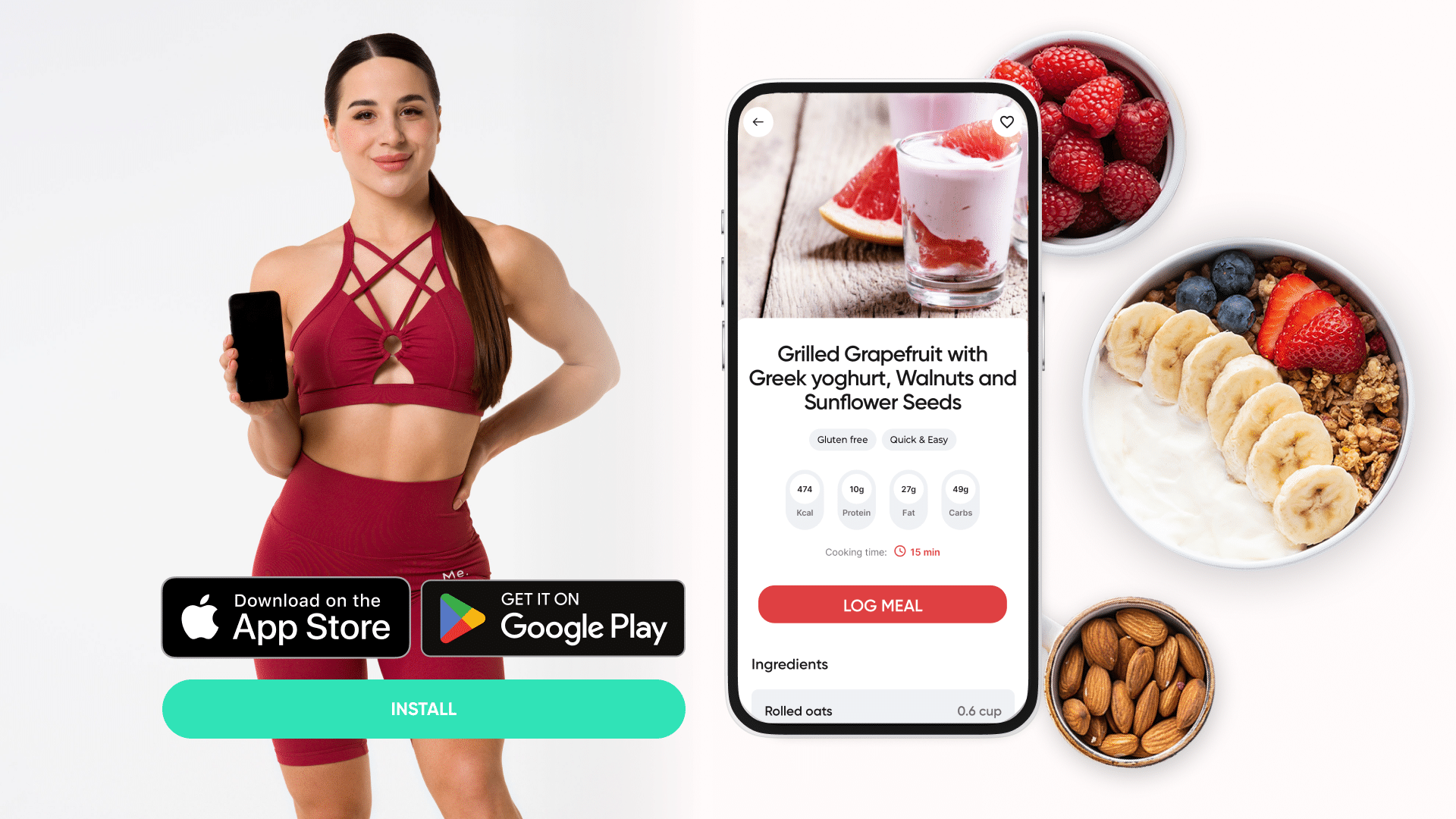Carbohydrates are one of three essential macronutrients. Our bodies need them for energy, but not all carbs are created equal. When you are trying to lose weight, it can be helpful to understand which foods are high in carbohydrates, how they can impact your health, and how they affect your weight loss journey. Many of these foods are everyday items that appear harmless but pack a significant calorie punch, which can hinder your progress.
This article will reveal 12 high-carb foods that you may want to avoid if you’re on a low-carb diet for weight loss, and we suggest low-carb foods that you can enjoy instead. These alternatives will help you maintain a balanced diet while also assisting you in achieving your weight loss goals without feeling deprived.
Remember, the key is not to eliminate carbs completely, but to choose the ones that provide more nutritional benefits, keep you feeling full for longer, and support your overall health.
Do Carbohydrates Cause Weight Gain?
Carbohydrates do not inherently cause weight gain. Weight gain is typically the result of consuming more calories than your body uses, regardless of whether they come from carbs, fats, or proteins (21).
However, certain types of carbohydrates, such as simple sugars and refined grains, can easily be overeaten and can provide a lot of calories without making you feel very full. In addition, these types of carbs tend to be less nutrient-dense than complex carbs that are found in whole foods.
So, while carbs themselves don’t cause weight gain, the type of carbs you choose and the overall balance of your diet can influence your weight. It’s also important to note that individual carbohydrate needs can vary based on factors such as physical activity level.
What Is the Number 1 Worst Carb to Avoid for Weight Loss?
The number 1 worst carb to avoid, particularly if you’re trying to lose weight, is added sugar.
Added sugars are typically found in ultra-processed foods, which generally provide a lot of calories but relatively few nutrients or fiber. They don’t provide much or any nutritional value and they don’t make you feel very full after you eat them, despite containing a significant number of calories (17).
The CDC recommends limiting added sugars to less than 10% of your total calories (10), while the American Heart Association suggests no more than 100 calories (6 teaspoons) per day for women and 150 calories (9 teaspoons) per day for men (2).
Refined or processed grains, particularly those that are found in white bread, are also on the list of carbs to avoid (23).
White bread is made from refined grains that have had the bran and germ removed during processing. This removes the majority of the fiber, vitamins, and minerals, and leaves mainly the starchy endosperm. The result is a food that is high in quickly digested simple carbs and low in nutrients.
Consuming white bread can cause a rapid spike in blood sugar and insulin levels, which can lead to increased hunger and potential overeating (22).
Furthermore, as white bread is low in fiber, it’s less satisfying than whole-grain bread, so you may find yourself feeling hungry again soon after eating it. This makes it easier to consume too many calories when you eat white bread, which can hinder your weight loss efforts.
A healthier alternative is breads that are made from whole grains (24). Whole-grain bread contains all the parts of the grain — the bran, germ, and endosperm. Bread that is made from whole grains is higher in fiber and other nutrients, and it is digested more slowly, which can help control blood sugar levels and keep you feeling full longer.
You don’t need to eliminate these foods altogether, as enjoyment of food is also important, and being too restrictive with your diet can backfire or cause harm.
Pairing these high-carb foods with protein or healthy fats can also help slow down the absorption of carbs and keep you feeling full. For example, instead of eating a plain bagel, pair it with avocado or nut butter. Instead of plain white rice, add some grilled chicken or tofu and vegetables.
If you’ve mustered up the courage to crush your weight loss goal, let Betterme take the sting out of this demanding process. Our app will help you restructure your habits, remold your life and crank up your fitness results!
Which Foods Are Highest in Carbs?
The high-carb foods we want to limit are generally those that are highly processed or made from refined grains, which tend to be high in simple sugars (1)
Below is a list of 15 high-carb foods to avoid to lose weight:
1. Bread, Grains, and Pasta
Bread, grains, and pasta are staple foods in many diets. They are high in carbohydrates, particularly when made from refined white flour. These types of carbohydrates are quickly digested and provide a lot of calories with almost no fiber, meaning that you don’t get much of a feeling of fullness (15).
You should consider choosing whole-grain options instead. Whole grains are higher in fiber and other nutrients, which makes them a healthier choice. They are digested slowly, which helps keep blood sugar levels stable and makes you feel satisfied for longer (7).
Whole-wheat breads, brown rice and other whole-grain rice varieties, and whole-wheat pasta may be better choices than their white counterparts.
2. Sugary Foods
Sugary foods, such as candy, cookies, and cakes, are high-carb foods to avoid when you are trying to lose weight. They are high in simple sugars, which provide quick energy but can lead to a crash later on (15).
In addition, sugary foods are typically low in nutrients and high in empty calories, which means that they provide little nutritional value relative to their calorie content.
Opt for fresh fruits or dark chocolate as alternatives. Dark chocolate in moderation can be a healthier choice as it is lower in sugar and contains antioxidants (4).
While fruits contain sugar, they also provide fiber and important nutrients. Eat high-carb fruits in moderation to avoid extra calories from simple carbs.
3. Soft Pretzels
Soft pretzels are another high-carb food to avoid. They are made from refined flour and are high in quickly digested carbs and low in fiber and nutrients as a result.
Instead, you should opt for a handful of nuts or seeds. They are lower in carbs and provide healthy fats, protein, and fiber (11).
4. Processed Sugary Cereal
Processed cereals can be high in sugar and refined grains, both of which should be limited when on a low-carb diet.
A better breakfast option is a bowl of oatmeal with fresh fruit and nuts. Oats are a complex carbohydrate, which means they’re digested slowly and can help keep you feel full for longer(6).
5. Milkshakes
Milkshakes are high in sugar and often contain ice cream, which is also a high-carb food.
As an alternative, consider a smoothie that is made with unsweetened milk, a small amount of fruit, and plenty of greens. This will provide you with plenty of nutrients without the excess sugar and carbs.
6. Ice Cream
Ice cream is high in sugar and carbs. It’s also typically high in fat, which makes it a calorie-dense food that can contribute to weight gain.
For a healthier treat, consider a bowl of fresh berries topped with a dollop of Greek yogurt. You’ll get the sweetness you crave, in addition to beneficial nutrients and fiber.
7. Cereal Bars
Many cereal bars are packed with sugar and refined grains. Despite their healthy image, they can be quite high in carbs and calories.
You should buy bars that are made with whole foods such as nuts and seeds, and with minimal added sugars. Or better yet, make your own at home, so you can control what goes in them (if you have the time and inclination).
8. Alcohol
Alcoholic beverages, particularly sweet ones, can be high in carbs. In addition, alcohol provides empty calories and can stimulate the appetite, potentially leading to weight gain (3).
If you choose to drink, opt for dry wines, light beers, or spirits mixed with zero-calorie beverages. These options tend to be lower in carbs. However, avoiding alcohol altogether would probably help you lose weight faster.
Read more: Healthy Fast Food Breakfast: Fuel Your Mornings the Wholesome Way
9. Ultra-Processed Foods
Many ultra-processed foods are high in added sugars and other simple carbs, in addition to unhealthy fats and sodium. They’re also often low in nutrients and fiber (20).
You should focus on eating a variety of whole foods instead. They are typically higher in nutrients and fiber and lower in carbs and calories.
10. Sweets and Desserts
Sweets and desserts are typically high in added sugar and other refined carbs, which contributes to their high carb content. They can also be quite calorie-dense and eating them regularly can contribute to weight gain (14).
Consider satisfying your sweet tooth with a piece of fruit or a serving of yogurt instead. These foods are naturally sweet and provide a range of beneficial nutrients.
11. Pancakes
Traditional pancakes that are made from white flour are high in carbs and low in fiber. They can be high in calories and aren’t particularly filling, which may contribute to overeating.
Try making pancakes using whole-wheat flour, or almond or oat flour for a lower-carb alternative. These versions also provide more fiber and protein.
12. Soft Drinks
Soft drinks and other sweetened beverages are high in added sugar and carbs (9). Drinking them can contribute a significant amount of calories to your diet, and these liquid calories don’t make you feel full in the same way food does (12).
Consider swapping soft drinks for water, unsweetened iced tea, or flavored sparkling water. These beverages are virtually carb-free and calorie-free and are far better for your overall health.
What Carbs Should I Avoid to Lose Weight?
It’s generally recommended to limit the following types of carbohydrates if you want to lose weight:
- Refined Carbs: These have been processed and stripped of their natural fiber and nutrients. Examples include white bread, white rice, and pastries.
- Simple Sugars: These are quickly digested and can cause a rapid spike in blood sugar levels. Examples include table sugar, corn syrup, and anything with added sugars.
- Sugary Drinks: Beverages such as soda, sweet tea, and fruit juices are high in sugar and can add a significant number of empty calories to your diet.
- High Glycemic Index Carbs: These are foods that cause a rapid rise in blood sugar levels. Many ultra-processed foods fall into this category.
- Low-Fiber Carbs: Fiber slows the digestion of carbs, which helps you feel full longer. Avoid carbs that are low in fiber such as many ultra-processed foods.
Some of the categories listed above overlap. For example, refined carbs are generally high in simple sugars and have a high glycemic index.
Another important thing to note is that some healthy complex carbs also contain high amounts of carbohydrates. These include foods such as potatoes, beans, legumes, fruits, and whole grains. Most people don’t need to limit these, unless they have a medical reason or are following a very low-carb diet.
Reasons why BetterMe is a safe bet: a wide range of calorie-blasting workouts, finger-licking recipes, 24/7 support, challenges that’ll keep you on your best game, and that just scratches the surface! Start using our app and watch the magic happen.
What Carbs Should I Eat to Lose Belly Fat?
To lose belly fat, you’ll need to create a calorie deficit that promotes weight loss in general. To help you do this, you should focus on incorporating the following types of carbohydrates into your diet:
Complex Carbohydrates
These are digested slowly, which keeps you satisfied for longer and prevents overeating. They’re found in foods such as whole grains, starchy vegetables, and legumes (13).
High-Fiber Carbohydrates
Fiber is essential for weight loss as it promotes satiety and aids digestion (5). Opt for carbs that are high in fiber such as whole fruits, vegetables, and whole grains.
Low Glycemic Index Carbohydrates
Foods that have a low glycemic index cause a slower, steadier rise in blood sugar levels (16). They tend to be higher in fiber, which can help manage hunger.
Whole Foods
Whole foods are minimally processed and typically higher in nutrients and fiber than their more refined counterparts.
Read more: 15 High Carb Foods To Avoid for Weight Loss and What To Eat Instead
Carbohydrates with Protein
Pairing carbohydrates with protein can help promote muscle growth and recovery while also keeping you feeling full, which can aid weight loss and reduce belly fat (8) (19). Foods such as legumes and quinoa are good sources of carbohydrates and protein (18).
It’s important to remember that while these types of carbs can support weight loss, you still need to maintain a balanced diet and engage in regular physical activity. And, as ever, portion control is key – even healthy foods can contribute to weight gain if they are eaten in excess.
In addition, some people may find that temporarily reducing their carb intake of both unhealthy and healthy carbohydrate foods can help them reach their weight loss goals.
In this case, it’s important to focus on getting your carbs primarily from fruit and vegetables and consume limited amounts of whole grains. This approach isn’t safe for everyone, so you should talk to your healthcare provider first.
FAQs
What are the 5 foods that burn belly fat?
A healthy balanced diet with a calorie deficit is what burns belly fat, not specific foods. Some examples of foods you should include in a healthy balanced diet are:
- Beans: High in soluble fiber, beans can help reduce belly fat by making you feel full for longer, thereby helping control calorie intake.
- Fish: Rich in lean protein and healthy fats, fish can aid with weight loss.
- Dark Leafy Greens: Foods such as spinach and kale are low in calories and high in fiber, which can help with weight reduction and belly fat loss.
- Flaxseeds: These are rich in healthy fats and dietary fiber, which helps with weight loss and reducing belly fat.
- Eggs: High in protein, eggs can keep you satisfied for long periods, which helps with overall weight loss and the reduction of belly fat.
Are potatoes bad carbs?
Potatoes are not necessarily “bad” carbs, but they are high in carbohydrates and can raise blood sugar levels if they are eaten in large amounts, so people with diabetes should be aware of this. They can be a part of a healthy diet if they are consumed in moderation and prepared in a healthy way, such as baking or boiling rather than frying.
What happens if you stop eating bread for 14 days?
If you stop eating bread for 14 days, you may notice some changes, depending on your overall diet.
If bread is your main source of carbohydrates and you don’t replace it with other healthy complex carbohydrate sources, you may experience symptoms such as cravings, tiredness, and irritability.
If you replace white bread with whole grains, beans and legumes, and high-carb vegetables, you may find that you feel fuller for longer and don’t need to eat as much to be satisfied.
What can I eat instead of bread and potatoes?
Instead of bread, you should consider options such as lettuce wraps, cauliflower “bread,” or whole-grain tortillas. For potato alternatives, try sweet potatoes, turnips, cauliflower, or squash. These alternatives often offer more nutrients and fiber than traditional bread and potatoes.
The Bottom Line
A low-carb diet can be effective for weight loss and reducing belly fat, but it’s important to focus on nutritious whole foods and limit ultra-processed options. In addition, proper portion control is essential.
By including high-fiber carbs such as whole grains, beans and legumes, and fruits and vegetables, swapping sugary drinks for water or unsweetened tea, and avoiding added sugars and refined carbs, you can make sure your diet is balanced and supports your weight loss goals.
DISCLAIMER:
This article is intended for general informational purposes only and does not serve to address individual circumstances. It is not a substitute for professional advice or help and should not be relied on for making any kind of decision-making. Any action taken as a direct or indirect result of the information in this article is entirely at your own risk and is your sole responsibility.
BetterMe, its content staff, and its medical advisors accept no responsibility for inaccuracies, errors, misstatements, inconsistencies, or omissions and specifically disclaim any liability, loss or risk, personal, professional or otherwise, which may be incurred as a consequence, directly or indirectly, of the use and/or application of any content.
You should always seek the advice of your physician or other qualified health provider with any questions you may have regarding a medical condition or your specific situation. Never disregard professional medical advice or delay seeking it because of BetterMe content. If you suspect or think you may have a medical emergency, call your doctor.
SOURCES
- 14 Foods to Avoid (or Limit) on a Low-Carb Diet (2023, healthline.com)
- Added Sugars (2021, heart.org)
- Alcohol Consumption and Obesity: An Update (2015, link.springer.com)
- Dark chocolate: An overview of its biological activity, processing, and fortification approaches (2022, sciencedirect.com)
- Dietary Fiber and Energy Regulation (2007, sciencedirect.com)
- Dietary fiber and satiety: the effects of oats on satiety (2015, ncbi.nlm.nih.gov)
- Dietary Fibre from Whole Grains and Their Benefits on Metabolic Health (2020, mdpi.com)
- Dietary Protein and Muscle Mass: Translating Science to Application and Health Benefit (2019, mdpi.com)
- Effects of Soft Drink Consumption on Nutrition and Health: A Systematic Review and Meta-Analysis (2007, ncbi.nlm.nih.gov)
- Get the Facts: Added Sugars (2021, cdc.gov)
- Health Benefits of Nut Consumption (2010, mdpi.com)
- Liquid calories, sugar, and body weight (2007, sciencedirect.com)
- Physiology, Carbohydrates (2023, ncbi.nlm.nih.gov)
- Relationship between Added Sugars Consumption and Chronic Disease Risk Factors: Current Understanding (2016, mdpi.com)
- The Carbohydrate-Insulin Model of Obesity: Beyond ‘Calories In, Calories Out’ (2018, ncbi.nlm.nih.gov)
- The effects of meal glycemic load on blood glucose levels of adults with different body mass indexes (2017, ncbi.nlm.nih.gov)
- The Impact of Free Sugar on Human Health—A Narrative Review (2023, mdpi.com)
- The Role of Legumes in Human Nutrition (2016, intechopen.com)
- The role of protein in weight loss and maintenance (2015, sciencedirect.com)
- Ultra-Processed Foods and Health Outcomes: A Narrative Review (2020, mdpi.com)
- Weight Change – Clinical Methods (1990, ncbi.nlm.nih.gov)
- Which High-Carb Foods Should You Eat? (2023, verywellhealth.com)
- Whole grains, refined grains and fortified refined grains: What’s the difference? (2000, pubmed.ncbi.nlm.nih.gov)
- Whole Grains (n.d., hsph.harvard.edu)
.gov)










